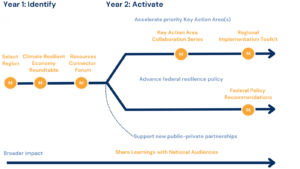Through the Climate Resilient Communities Accelerator, public, private, and community stakeholders are outlining a path forward for coordinated efforts in the region. The Accelerator builds on and complements existing climate resilience programs and is designed to scale across multiple U.S. regions to elevate policy gaps and opportunities to federal lawmakers.
In the first year of the North Front Range Accelerator, C2ES worked with the Climate Adaptation Partnership at Colorado State University to host two convenings in 2023: a Climate Resilient Economies Roundtable in October and a Resources Connector Forum in November. These convenings aimed to connect communities and businesses to each other and help expand the pool of potential partners, including economic development groups, community-based organizations, NGOs, and state and federal agencies. The discussions were designed to augment local resilience efforts by uncovering strategies that can reduce the impacts of more than one climate hazard and will require action from a broad range of actors to succeed.
C2ES developed a Summary Report to capture the 2023 Accelerator convenings and process, including stakeholder engagement, current and projected wildfire and heat impacts, the shared regional vision for a prosperous future, key action areas for resilience, and opportunities to accelerate progress in the action areas.
Building on the first year’s success in identifying a path forward and key action areas, the second year focuses on activating stakeholders around several key action areas and amplifying local priorities to federal policymakers. As part of a partnership with the City of Longmont, Colorado supported by the Accelerator, AT&T saw an opportunity to produce neighborhood-level heat analysis for the North Front Range.
The C2ES Climate Resilient Communities Accelerator was launched with generous support from the Bank of America Charitable Foundation.
Climate Resilient Communities Accelerator Process

2024 Key Action Areas
Building on the first year’s success in identifying a path forward and some key action areas, the second year focuses on activating stakeholders around a set of solutions selected by participants: microgrids and resilience hubs.
Microgrids are small-scale power grids that can operate independently or in conjunction with an area’s main electrical grid, and resilience hubs are trusted gathering spaces enhanced to provide safety for community members. Accelerator participants discussed how existing community centers and spaces could increase everyday resilience, as well as before, during, and after emergencies—like wildfires and extreme heat—and defined steps to advance these solutions in the region. Our recent blog post delves into these promising solutions and our collaborative work to enhance climate resilience in the region.
This next year of the Accelerator aims to inform, connect, and empower stakeholders with discussions that lead to the next steps for key action areas and a regional implementation toolkit.

